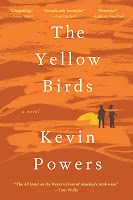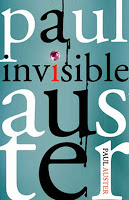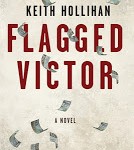 My last post was about poetry collections. Since then, I’ve been reading novels by poets. I started with The Yellow Birds (M) by Kevin Powers.
My last post was about poetry collections. Since then, I’ve been reading novels by poets. I started with The Yellow Birds (M) by Kevin Powers.
This book had come recommended from several different people – one describing it as rich, but not complicated. I didn’t know Kevin Powers was a poet until I read the author bio. I also didn’t know the book was about war – Iraq. I can be closed-minded when it comes to war; I don’t want that as a central theme or setting. But it’s hard to avoid altogether. I found Kevin Powers’ novel somber and reflective. It depicted a reality of place and circumstance that felt genuine without being glorifying. The characters were complex, and I was particularly struck by the difficulties around intimacy; Powers skillfully portrays the struggle to relate to others (on a variety of levels) who have not shared the same experiences.
From there I moved onto Ben Lerner’s Leaving the Atocha Station (M). This book follows an American poet, Adam Gordon, who travels to Spain on a scholarship. I had been planning to read this book for close to a year; the more time that went by, it seems, the more my expectations grew.
 But it didn’t take long for the narrator to push me away. He is young and medicated and his introspection delves into obsession and paranoia; he does not trust others, and buries himself inside himself; it is as though he is playing a game of chess with the whole world, trying to stay ahead of every possible move. At times, it reminded me of Crime and Punishment. Characters are an integral part of an enjoyable reading experience for me; I want them to be observant and reflective, but if they spend too much time in their own head, I feel like mine is going to burst. Leaving the Atocha Station also chronicles the 2004 train bombings in Madrid, and the social and political response. And the author pays careful attention to detail and language – similar to Powers. But Lerner examines language in a more direct way. Adam Gordon speaks little Spanish, and does not want to become fluent. He prefers to live in the murk of attempted translation; to respond to questions and statements that he only partially understands. These moments traded the heaviness of self-sabotage in favour of the general wonder and frustration of language. I enjoyed these examinations, and the personification of grammatical parts. But ultimately, I preferred The Yellow Birds.
But it didn’t take long for the narrator to push me away. He is young and medicated and his introspection delves into obsession and paranoia; he does not trust others, and buries himself inside himself; it is as though he is playing a game of chess with the whole world, trying to stay ahead of every possible move. At times, it reminded me of Crime and Punishment. Characters are an integral part of an enjoyable reading experience for me; I want them to be observant and reflective, but if they spend too much time in their own head, I feel like mine is going to burst. Leaving the Atocha Station also chronicles the 2004 train bombings in Madrid, and the social and political response. And the author pays careful attention to detail and language – similar to Powers. But Lerner examines language in a more direct way. Adam Gordon speaks little Spanish, and does not want to become fluent. He prefers to live in the murk of attempted translation; to respond to questions and statements that he only partially understands. These moments traded the heaviness of self-sabotage in favour of the general wonder and frustration of language. I enjoyed these examinations, and the personification of grammatical parts. But ultimately, I preferred The Yellow Birds.
 I checked Novelist for suggestions of where to go next. Every title related to The Yellow Birds revolved around the military content. I was reluctant to see the suggestions for Leaving the Atocha Station – I didn’t think I could handle another narrator like Adam Gordon. But I liked what I found. A Kim Stanley Robinson (M) book that I had read and enjoyed. A Jim Harrison (M) book – someone else I’ve been meaning to read after hearing a great interview with Eleanor Wachtel. And the one I settled on, Invisible (M) by Paul Auster. Also about a poet, the books are both character-driven and share the subject Identity (psychology). I’m devouring it. The protagonist, who also travels abroad on a scholarship, struggles to find happiness and often feels like an outcast. But he is not so self-loathing. And of course, Paul Auster is a poet too.
I checked Novelist for suggestions of where to go next. Every title related to The Yellow Birds revolved around the military content. I was reluctant to see the suggestions for Leaving the Atocha Station – I didn’t think I could handle another narrator like Adam Gordon. But I liked what I found. A Kim Stanley Robinson (M) book that I had read and enjoyed. A Jim Harrison (M) book – someone else I’ve been meaning to read after hearing a great interview with Eleanor Wachtel. And the one I settled on, Invisible (M) by Paul Auster. Also about a poet, the books are both character-driven and share the subject Identity (psychology). I’m devouring it. The protagonist, who also travels abroad on a scholarship, struggles to find happiness and often feels like an outcast. But he is not so self-loathing. And of course, Paul Auster is a poet too.



